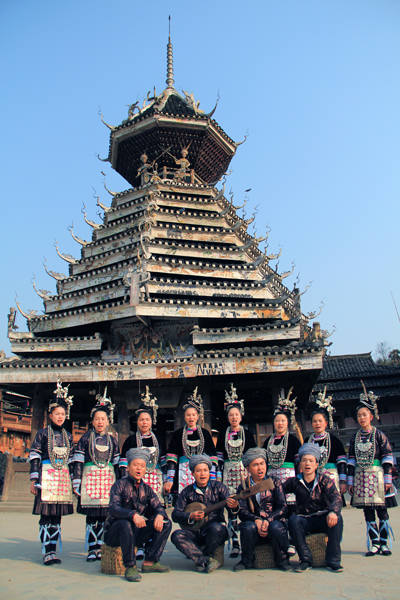|
 |
|
VILLAGE SINGERS: Some Dong singers, wearing traditional costumes, perform in front of a Dong tower in Xiaohuang Village, Congjiang County, Guizhou Province. This village is well known for training Dong singers over the past 60 years (ZHUANG YUAN) |
Dong songs bring urban people a breeze of fresh air. But as time passes by, people might soon forget this kind of music, she said.
Dong song singers felt uncertain about the destiny of the choir. Wu Jinyan said two women in the choir are married and have just given birth. They have to take care of their babies. For other members, performing is just a way of making money to support their families.
"If the performance is unpopular, we have to pay for the failure. And we really don't have much money," Wu Jinyan said.
All the choir members were lodged in a basement when they came to Beijing in February. The temperature was still low. Cold weather and repeated rehearsal led to their sleeplessness.
Luckily, the good reputation of their debut brought about considerable income. Each member of the choir earned 6,000 yuan ($954) at the end of six performances in March. Thanks to the help of a friend, the singers moved to a comfortable apartment.
Wu Jinyan said some of the members will return to their hometown once the performing season ends. But she will stay in Beijing. Wu Hongfei helped her find a job at 798 Art Zone in Chaoyang District so that she could earn a living even if there is no performance in the next few months.
Wu Hongfei and Wu Jinyan plan to recruit some more singers and grope for a sustainable pattern for the choir to promote the ancient Dong stage art in Beijing in the future.
The sensation of the choir aroused people's consideration of how to protect the cultural heritage.
"The Dong songs are a symbol of Dong ethnic identity and their cultural heritage," said Zhao Xiaonan, a professor of Central Conservatory of Music, who has been studying the Dong songs for over 10 years.
A popular saying among the Dong people has it "rice nourishes the body and songs nourish the soul." Their tradition of passing on culture and knowledge in music is exemplified in the Grand Song of the Dong Ethnic Group, multi-part singing performed without instrumental accompaniment or a leader. The repertoire includes a range of genres such as ballads, children's songs, songs of greeting and imitative songs that test performers' virtuosity at mimicking the sounds of animals.
Usually a choir is made up of at least three people. The more people a choir has, the better the sound is.
Many of the Dong songs have been preserved for 1,000 years. This is because the Dong people only have spoken language and they don't have written records. Consequently, they wrote their culture and lifestyle into songs. Therefore, they constitute a Dong encyclopedia, narrating the people's history, extolling their belief in the unity of humans and nature, preserving scientific knowledge, expressing feelings of romantic love, and promoting moral values such as respect for one's elders and neighbors.
Both the central and local governments have devoted many efforts to protecting this intangible cultural heritage. In 1984, the local government launched a project to teach Dong songs at schools in Dong areas. In this way, many Dong people, such as Wu Jinyan, become qualified singers of Dong songs.
With the help of local governments, many Dong song choirs are able to perform at various art events at home and abroad. Some villages have won good reputation due to their contribution to promoting Dong songs. For example, Xiaohuang Village was honored as National Folk Art Village by the Ministry of Culture in 1996.
In 2009, the Grand Song of the Dong Ethnic Group was inscribed on the Representative List of the Intangible Cultural Heritage of Humanity by the United Nations Educational, Scientific and Cultural Organization. Shortly afterward, Guizhou Province developed tourism routes in Dong areas, such as Liping County and Congjiang County.
"Though the efforts have generally paid off, the Dong songs still face the lack of successors. Due to urbanization, many young Dong people have moved to cities. There are fewer and fewer singers in the villages," said Zhao.
Wu Jinyan has made a good effort to promote the ancient songs in the bustling cities. She and her friends hope for the best of Dong songs in Beijing and their hometown.
Email us at: baishi@bjreview.com | 